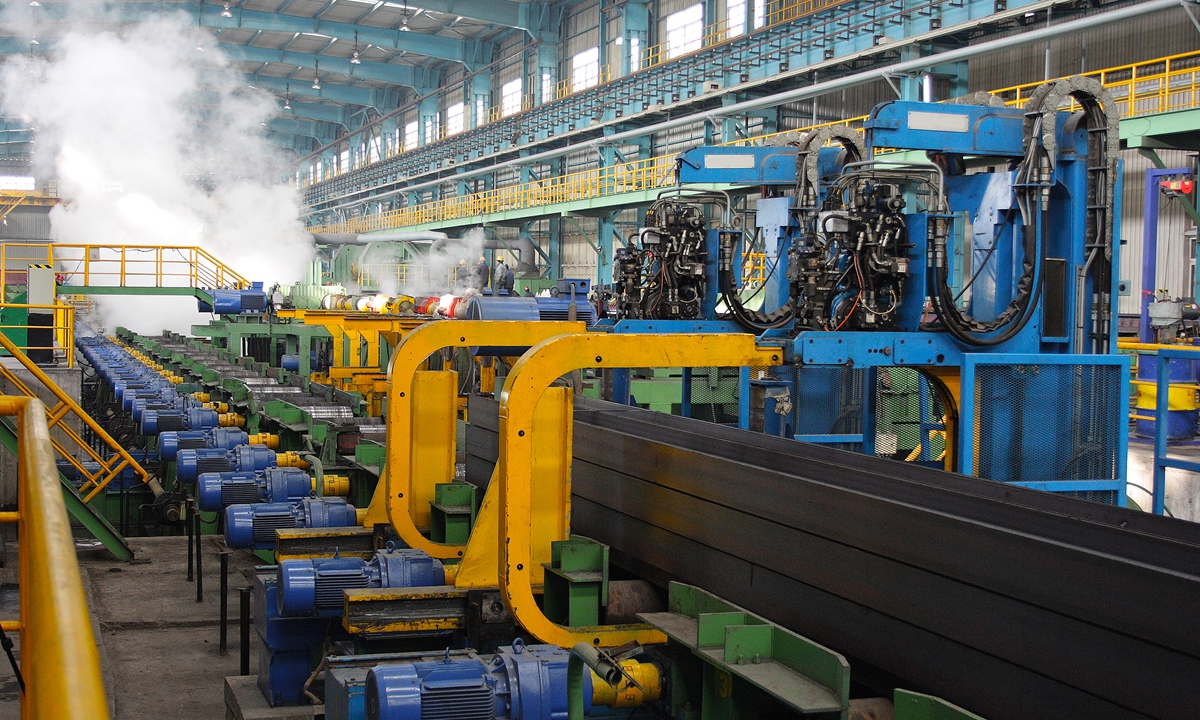China mulls supportive package to spur private economy following top-design 31-point guideline

The manufacturing line of a NEV factory in Southwest China's Chongqing Municipality Photo: VCG
China will mull providing more supportive measures for the private economy in recent days, including policy documents on facilitating the development of the private economy and driving private investment, as well as a new version of a negative list for private investors, the country's top economic planner said on Thursday, as part of a concrete, multi-pronged package built upon a top-design policy guideline issued on Wednesday night.
The 31-point guideline touched on a variety of issues that are of key concerns to private businesses, ranging from market entry, fair competition, legal protection, financing support and fundraising to intellectual property right protection and innovation input.
Overnight, the effects of the guideline have already been reverberating across multiple areas. Some of the over 44 million Chinese entrepreneurs hailed it as "a much-needed shot in the arm and a boost to their confidence," inspiring them to take more responsibility in the country's march toward common prosperity.
Private businesses have played an increasingly pivotal role in spurring economic growth, creating employment and revving up technological innovation. While a stabilized private economy is set to inject certainty into the Chinese economic growth amid growing downward pressures, observers stressed that the move is an affirmation of the country's "two unswervinglys" stance on equal support for public and non-public sectors, rather than what some Western media tout as boosting a long-subdued sector with temporary pills for an "ailing economy."
It also slaps what some Chinese doomsayers peddle as a "multi-year crackdown" against the private sector, a claim that observers said could be aimed at instigating confrontation between China's public and private enterprises. A properly designed and timely guideline with clear red lines is conducive for the sound development of private sector, they noted.
More package measures
Li Chunlin, vice chairman of the National Development and Reform Commission (NDRC), the country's top economic planner, said at a press briefing of the State Council Information Office on Thursday that the NDRC will soon release two documents on a number of measures on boosting the growth of the private economy and motivating private investment.
"They're the accompanying measures to the guideline [issued on Wednesday]. It is expected that the slew of policies released later will lead to its better implementation, and spur the high-quality development of the private economy," Li said.
He also vowed that the NDRC will work with relevant departments to strengthen efforts to create a better environment for private businesses, such as launching a new version of the negative list of market access for private investors, and reports on typical cases that violate the negative list.
With the top design well articulated, observers said implementation will be the key focus in the next stage.
"We expect a combo of policy support from various government departments including financial and tax authorities as well as localities soon, addressing the headaches and concerns of private businesses," Li Chang'an, a professor at the Academy of China Open Economy Studies of the University of International Business and Economics, told the Global Times on Thursday.
The Communist Party of China Central Committee and the State Council issued the 31-measure guideline on Wednesday night.
It is by far one of the most comprehensive pieces of support for the private economy, which is of landmark significance and further embodies the clause "private economy as an important component of the basic socialist economic system" being written into the Constitution, and a clear support for the expansion of the private economy delivered by the Report to the 20th National Congress of the Communist Party of China, analysts said.
In interpreting the guideline, Chinese officials said on Thursday that improving the basic system and launching practical measures to "shore up the confidence" of the private sector is urgently needed, as the confidence of entrepreneurs has been impacted to a certain extent amid challenges posed by the pandemic and certain changes in the global geopolitical environment.
"You name it, the guideline has it. For private businesses lacking capital support, the guideline provides solutions on financing, fundraising and direct financial assistance. It also urges research institutes to provide research and development support to speed up private enterprises' innovation efforts," Pan Helin, a research fellow with the International Business School, Zhejiang University, told the Global Times on Thursday.
Refuting foreign hype of crackdown
The guideline was widely welcomed among Chinese private firms, which make up over 90 percent of all enterprises and contribute to 80 percent of urban employment.
Private entrepreneurs reached by the Global Times said that support from the government is concrete, pushing back against the foreign rhetoric that China only realizes the importance of the private economy when the overall economy "loses steam."
An executive of a Shenzhen-based private tech start-up, who spoke on condition of anonymity, told the Global Times that downplaying the role of private business in China could be aimed at triggering conflicts between the private and public sectors.
"[The support] comes at a time of external turbulence, and is necessary because at this juncture, stabilizing the expectations of entrepreneurs is critical to ensuring job opportunities. Chinese tech companies have also become pioneers in technological breakthroughs in a number of white-hot tech fields such as artificial intelligence and semiconductors. They're more flexible to market changes," he added.
Cong Yi, a professor at the Tianjin University of Finance and Economics, told the Global Times that private enterprises deserve encouraging policies because they have vast potential in China's high-quality economic development, particularly in achieving the second centenary goal of building China into a great modern socialist country in all respects.
"One of the key steps to achieving that goal is unleashing market vitality through the massive number of private enterprises," Cong said.
In East China's Zhejiang Province, a pilot zone for common prosperity, the private sector now accounts for over 70 percent of its economic activity, the Zhejiang Daily reported.
According to the guideline, China will also regulate and guide the sound development of private capital in accordance with the law. It will set up "green and red lights" for private capital and improve systems and rules on capital movements.
The statement is also a clear rebuttal to concerns of a "crackdown on the platform economy" as hyped by some foreign media, Cao Heping, an economist at Peking University, told the Global Times on Thursday.
Pony Ma Huateng, CEO of Chinese internet giant Tencent, said in a statement sent to the Global Times that the guideline has clearly pointed out the development direction of the platform economy, bolstering its determination and motivation to continue expanding.
Cao said that in the past few years, the development of the private economy has gained widespread attention, which has included some false, one-sided opinions focusing on the faults and problems of certain private enterprises.
It is normal for issues to emerge during the development process, such as monopoly and abuse of power, but timely correction and supervision is necessary for the platforms' long-term development, observers said.
Pan said that introducing "red and green light" investment cases would give platform companies a better reference when they invest, and would also clearly show where the redline lies.



